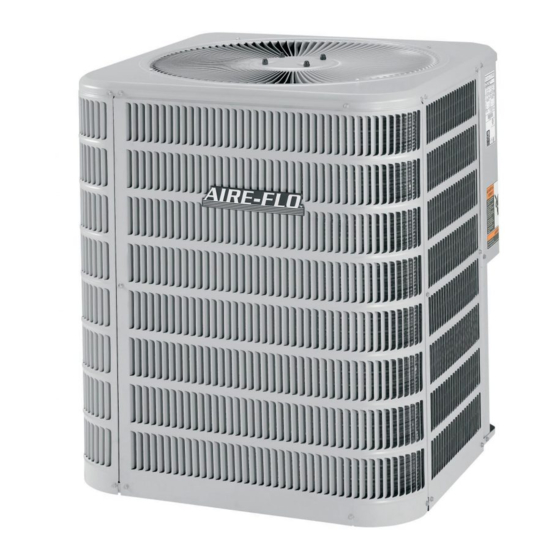Aire-Flo 4AC14 Series Istruzioni per l'installazione/avvio/manuale informativo per il proprietario della casa - Pagina 4
Sfoglia online o scarica il pdf Istruzioni per l'installazione/avvio/manuale informativo per il proprietario della casa per Condizionatore d'aria Aire-Flo 4AC14 Series. Aire-Flo 4AC14 Series 10. Split system air conditioner

Installation Of Line Sets
DO NOT fasten liquid or suction lines in direct contact
with the floor or ceiling joist.
suspension type of hanger. Keep both lines separate, and
always insulate the suction line. Long liquid line runs (30
feet or more) in an attic will require insulation. Route
refrigeration line sets to minimize length.
DO NOT let refrigerant lines come in direct contact with
foundation. When running refrigerant lines through the
foundation or wall, openings should allow for a sound and
vibration absorbing material to be placed or installed
between tubing and foundation.
foundation or wall and refrigerant lines should be filled with
a vibration damping material.
If ANY refrigerant tubing is buried, provide a 6 inch
vertical rise at service valve. Refrigerant tubing
lengths up to 36 inches may be buried without further
special consideration. For lengths above 36 inches,
consult your local distributor.
Before making braze connections, be sure all joints are
clean. Before heat is applied for brazing, dry nitrogen
should be flowing through the tubing to prevent oxidation
and scale formation on the inside of the tubing.
The following is the recommended method for making
braze connections at the refrigerant line connections:
1. Debur and clean refrigerant tube end with emery
cloth or steel brush.
2. Insert tubing into swage fitting connection.
3. Wrap wet rags over valves to protect from heat.
4. Allow dry nitrogen to flow through refrigerant lines.
5. Braze joint, using a suitable brazing alloy for copper
to copper joints.
6. Quench the joint and tubing with water using a wet
rag. Leave rag on fitting body and re-wet with water
to help cool area.
Leak Check
Refrigeration lines and indoor coil must be checked for
leaks after brazing and before evacuation.
recommended procedure is to apply a trace amount of
vapor refrigerant (approximately two ounces or 3 psig) into
the line set and indoor coil, then pressurize with 150 psig
of dry nitrogen. Use a refrigerant leak detector to check all
joints. The system may also be checked for leaks using a
halide torch or pressure and soapy solution.
completion of leak check, relieve all pressure from system
before evacuation.
506320-01
Use an insulated or
Any gap between
The
After
Issue 1012
Evacuating And Charging Instructions
It is unlawful to release refrigerants into the
atmosphere.
These outdoor units are pre-charged at the factory with
adequate refrigerant to handle 15 feet of refrigerant tubing.
1. Connect the vacuum pump to the center hose of the
manifold gauge set, the low-pressure manifold gauge
to the vapor service valve and the high pressure
manifold gauge to the liquid service valve.
2. The valves should be kept in the "front seated"
(closed) position. This will allow evacuation of the
refrigeration lines and the indoor coil, without
disturbing the factory charge in the outdoor unit.
3. Follow
the
vacuum
instructions. Allow the pump to operate until the
system has been evacuated down to 300 microns.
Allow the pump to continue running for an additional
15 minutes. Turn OFF the pump and leave the
connections secured to the two (2) service valves.
After 5 minutes, if the system fails to hold 1000
microns or less, check all connections for tight fit and
repeat the evacuation procedure.
4. Isolate the vacuum pump from the system by closing
the shutoff valves on the gauge-set. Disconnect the
vacuum pump.
5. After evacuation of the connecting lines, remove the
service valve cap and fully insert the hex wrench into
the stem. A back-up wrench is required on the valve
body to open the valve stem.
counterclockwise until the valve stem just touches
the coined edge.
Replace service valve cap and torque to 8-11 ft-lb on 3/8"
valves; 12-15 ft-lb on 3/4" valves; 15-20 ft-lb on 7/8" valves.
pump
manufacturer's
Back-out
Page 4 of 10
